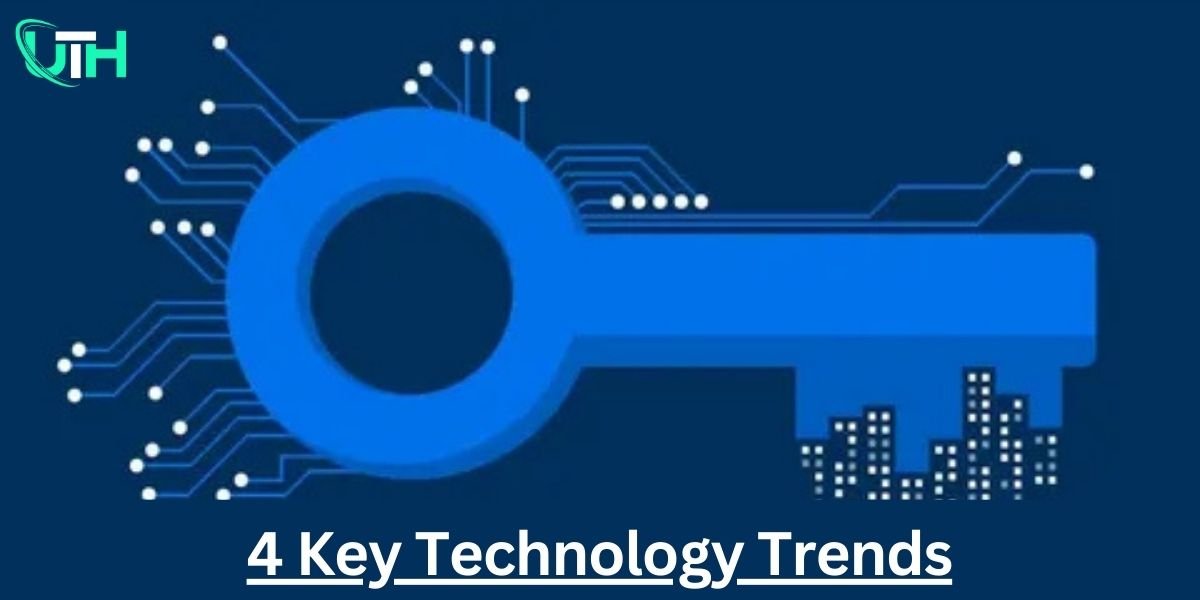Emerging Technologies
4 Key Technology Trends in the BFSI Sector and How Salesforce CRM Supports Them

Picture this: Early morning Brisks It’s your local bank, and you walk inside to find the door locked with a “We’ve Gone Digital. Come see us online” sticker. Confusion hits you like a tidal wave. You were already at digital. You could see your balance on the go with just a few taps on your cell phone.
But the truth was much more disruptive than you would have imagined. The industry that appeared to be safe, reliable, and traditional has been transformed so brutally and you got the boot.
This is a bit shocking or at least it sounds like it. A tech tsunami is about to hit the BFSI industry (banking, financial services, and insurance) and unless we change, relevance will soon turn into imagination. Blockchain, cloud, AI analytics, and Low-code platforms are not a trend, they are a revolution that has already begun.
As you’re not with the rest, your competitors will overtake you.
Most notably, technology is changing the face of how businesses are run. In BFSI, the gamification of it turns deadly. It is no longer only about boosting customer service or process efficiencies; it is living or dying. The financial services you provide now might be obsolete tomorrow if you are not on the cutting edge. More the pace of change and the ones that don’t adapt in time could end up as ghost cities.
How to keep up with the curve then? Here in this blog, we will talk about the top 4 technology trends that are changing the banking industry with BFSI for the Year 2025. However, if you are a bank an insurer, or any financial company these trends are your path to triumph or wreck.
Technology and its Role in the BFSI Sector
- Banking, Financials, and Insurance are very critical components of running the world economy.
- This industry has historically been centrist operating on a legacy model that had minimal start of digital.
- However, the need to cater to increasing customer demands and evolving cyber attacks is shifting industry momentum toward digital transformation.
- This is not only to enhance the customer experience, but also technology in BFSI will help make securing operational security stronger especially when using large data sets to drive useful insights or enterprise-wide operation scaling and make remote banking convenient
- In the rapidly changing, ultra-competitive world of finance firms, we need to embrace digitization to navigate forward.
- BFSI companies must focus on technology innovations now more than ever.
The 4 Technology Trends the BFSI Industry Will Experience in 2025
Technology trends in the BFSI sector will enable organizations to stay digitally sustainable and competitive as customer expectations change and new business models start emerging. This is the catchy provision for four upcoming technology trends that can touch and drive growth as well as security in the BFSI industry along with how technology road maps (like Salesforce) make those changes a reality.
Trend 1: Blockchain/Distributed Ledger Technology (DLT)
- Blockchain, one of the most popular distributed digital ledger technologies in the BFSI industry is decentralized. It has been extremely popular among BFSI enterprises owing in part to the boom of blockchain as it facilitates the execution of financial transactions in an expedited and secure manner i.e. allowing anybody to share a copy of the truth.
- Smart contracts are one of the most interesting blockchain applications in BFSI. Self-executing contracts trigger the end of an event as soon as certain conditions are met, reducing the need for human intervention and increasing operational agility in contract execution.
- Additionally, blockchain may be leveraged to create custom fintech products and services (e.g., digital assets, and identities).
- Salesforce drives toward a Connected Economy: How the company supports blockchain integration
- Salesforce launched its proprietary blockchain platform, Salesforce Blockchain in 2019 on top of the Hyperledger Sawtooth open-source technology. Through the low-code platform, BFSI organizations can build smart contracts, decentralized apps, and networks for secure data sharing via distributed ledger technology (DLT). Salesforce Blockchain is also powered by AI algorithms for process automation and continuous workflow.
The core of Salesforce Blockchain:
- Blockchain Builder: Provides toolkit to build decentralized app & network for partner collaboration
- Blockchain Connect: Enable Dapps to be securely distributed with clients for Salesforce Blockchain
Trend #2: Recent Growth of Low Code Platforms for Rapid App Development
As the fast pace of bringing new products and services into the market grows across the BFSI Industry, Low-code/no-code platforms will be accepted at an incredible speed to speed up application development. Having these platforms where developers and non-developers can build applications through point-and-click interfaces helped app development companies to create faster apps, with a significantly reduced time-to-market and lowered frustration walls from deep coding knowledge.
Low-Code Development on Salesforce:
Salesforce has packaged low-code and pro-code into a one-stop solution for organizations to rapidly develop and bring out the apps.
- Low-code tools: All the Salesforce (suite of &cobranded) by Salesforce
- Einstein Data Detect: Enables Automated Discovery & Locking of Sensitive Data [Helps to comply with privacy laws and regulations]
- Drag-and-Drop Components: Reduce the process of creating applications to Dynamic Interactions — helping developers build interactive solutions quickly.
- Einstein Automate: Decreases the time it takes to code flows by 70% using AI,
- Data and process: It integrates with Flow Orchestrator, MuleSoft Composer, and Omni Studio for frictionless automation.
- DevOps Center: The central dashboard allows teams to manage their environments, change tracking, and application integration with minimal coding.
Trend #3: Cloud adoption in BFSI sector
The BFSI sector has been seeing a big push towards cloud platforms, with companies embracing the cloud for cost savings and to scale/and or flexibility. The cloud provides necessary security and compliance for the BFSI industry with the ability to access data & applications on the go.
Salesforce Makes the Mobility Conversion Easy:
- Salesforce Financial Services Cloud (FSC) is built for BFSI, as in banks and insurance companies, mortgage brokers, FSC is a very comprehensive tool tail for these industries
Salesforce Financial Services Cloud Benefits:
- Financial Advisors: Allow users to have one central location for managing all the house and business-related information.
- Preconfigured Record Types: Customer Investments, Bank Accounts & Insurance Policies to have trackable Customer Data (Ease out on Account Management)
- Referral Components: Streamlines lead management and tracking of referrals
- Action Plans: Automates standard workflow tasks and promptly complies with industry regulations.
- Advisor Analytics: Insights grounded in data, enabling financial advisors to enhance customer relationships and experience.
Trend #4: Big Data Analytics
The BFSI industry is a data-driven space; organizations have difficulty deriving actual value out of the ocean of information that flows through this industry. The transformation of BFSI companies in terms of performance optimization, digitization, and decision enhancement using Big Data analytics is unstoppable. Risk analytics, predictive modeling, and customer segmentation will allow financial organizations to reduce their cost of customers and provide individual customer experiences optimized for ROI.
Big Data Analytics by Salesforce
BFSI companies are provided with tools by Salesforce (e.g., Einstein Analytics and Tableau CRM) to understand their big data. The AI-infused analytic tools also give you clear-cut insights, predictive-driven recommendations, and authentic modeling capabilities to enable smarter business decisions.
Key features are:
- CRM Synthetic Analytics: Seamless ingestion of internal and external data sources with this, the organization can directly come out with analysis & actions within Salesforce.
- Augmented Analytics: The intelligent and data-driven view of insights from AI/ML to further provide a broad analysis of customer behavior and business performance.
- Analytics Ready for the Enterprise: These tools are on top of the lightning-capable enterprise platform that Salesforce has internally.
- AI-based Analytics: AI is used across applications to conduct sentiment analysis, understand user intent, and object detection in images for efficiency improvements.
Cause You Need to Partner with a Pro to Maximize Salesforce CRM Success Salesforce has enormous capabilities in the BFSI sector, and its suite of tools Sales Cloud, Service Cloud, Financial Services Cloud, Einstein Analytics, and Tableau Cloud enable comprehensive transformation to financial organizations through digitization. Suppose a BFSI company collaborates with a seasoned Salesforce partner. In that case, they can take advantage of all the features and turn them into helpful techniques to increase customer experiences, offer operational gain, and maintain the highest levels of security and compliance.
-

 Phishing attack8 months ago
Phishing attack8 months agoWhat is Spear Phishing and How You Can Identify This Scam?
-

 Social engineering attack10 months ago
Social engineering attack10 months agoBaiting Attacks Explained: A Closer Look at Cyber Threat Tactics
-

 Social engineering attack8 months ago
Social engineering attack8 months agoWhat are Social Engineering Attacks – A Complete Guide to Cyberattacks Prevention
-

 Social engineering attack9 months ago
Social engineering attack9 months agoSpear Phishing Attack: A Targeted Cyber Threat
-

 Social engineering attack10 months ago
Social engineering attack10 months agoWhat is spear phishing attack? A detailed guide
-

 Phishing attack4 months ago
Phishing attack4 months agoWhy is Phishing Still a Major Cyber Threat? Everything You Need to Know
-

 Social engineering attack10 months ago
Social engineering attack10 months agoWhat is spear phishing in cyber security?
-

 Phishing attack8 months ago
Phishing attack8 months agoWhat Are Phishing Emails? A guide for you




















